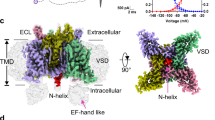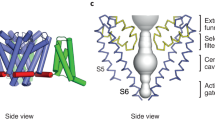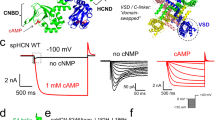Abstract
Sodium channels in plasma membranes can be blocked by a large variety of toxins1 and local anaesthetics2. This property, however, is not confined to relatively large molecules. For instance, extracellularly applied small ions like hydrogen may also prevent the passive transport of permeant cations across open Na+ channels3–6. A typical feature of this phenomenon3,5 is that the blocking action of hydrogen is gradually relieved by increasing the voltage applied across the membrane. Although in the frog skeletal muscle there is no clear evidence for a similar intracellular action7, we report here for the squid giant axon remarkable effects on the ionic permeability of Na+ channels when the internal perfusate contains an excess of protons. Analysing the action of low pH inside and outside the fibre in terms of a kinetic model3, we could conclude that Na+ channels in squid axons are controlled by two independent groups: one with an apparent pKa of 4.6 and the other with pKa 5.8, the former feeling one-fifth of the applied membrane potential, the latter three-quarters. As with pharmacological agents8, we also show that the voltage-dependence of the H+ blockage is not affected by the presence of the inactivation gate.
This is a preview of subscription content, access via your institution
Access options
Subscribe to this journal
Receive 51 print issues and online access
$199.00 per year
only $3.90 per issue
Buy this article
- Purchase on Springer Link
- Instant access to full article PDF
Prices may be subject to local taxes which are calculated during checkout
Similar content being viewed by others
References
Narahashi, T. Physiol. Rev. 54, 813–889 (1974).
Hille, B. J. gen. Physiol. 69, 475–496 (1977).
Woodhull, A. M. J. gen. Physiol. 61, 687–708 (1973).
Schauf, C. F. & Davis, F. A. J. gen. Physiol. 67, 185–195 (1976).
Campbell, D. T. & Hille, B. J. gen. Physiol. 67, 309–323 (1976).
Ohmori, H. & Yoshii, M. J. Physiol., Lond. 267, 429–463 (1977).
Nonner, W., Spalding, B. C. & Hille, B. Nature 284, 360–363 (1980).
Yeh, J. Z. J. gen. Physiol. 73, 1–21 (1979).
Wanke, E., Carbone, E. & Testa, P. L. Biophys. J. 26, 319–324 (1979).
Carbone, E., Testa, P. L. & Wanke, E. Biophys. J. (submitted).
Armstrong, C. M., Bezanilla, F. & Rojas, E. J. gen. Physiol. 62, 375–391 (1973).
Hille, B. J. gen. Physiol. 66, 535–560 (1975).
Carbone, E., Fioravanti, R., Prestipino, G. & Wanke, E. J. Membrane Biol. 43, 295–315 (1978).
Bicher, H. I. & Ohki, S. Biochim. biophys. Acta 255, 900–904 (1972).
Yeh, J. Z. & Narahashi, T. J. gen. Physiol. 69, 293–323 (1977).
Rojas, E. & Rudy, B. J. Physiol., Lond. 262, 501–531 (1976).
Author information
Authors and Affiliations
Rights and permissions
About this article
Cite this article
Wanke, E., Carbone, E. & Testa, P. The sodium channel and intracellular H+ blockage in squid axons. Nature 287, 62–63 (1980). https://doi.org/10.1038/287062a0
Received:
Accepted:
Issue Date:
DOI: https://doi.org/10.1038/287062a0
This article is cited by
-
Intracellular binding of cationized ferritin prolongs the time course of sodium channel inactivation in squid giant axons
The Journal of Membrane Biology (1986)
-
Pace-maker current changes during intracellular pH transients in sheep cardiac Purkinje fibres
Pflügers Archiv (1985)
-
Hydrogen ion current through sodium channels in myelinated nerve fiber membrane
Neurophysiology (1983)
-
The permeability of sodium channels to hydrogen ions in nerve fibres
Pfl�gers Archiv European Journal of Physiology (1983)
-
Interaction of batrachotoxinin-A benzoate with voltage-sensitive sodium channels: The effects of pH
Cellular and Molecular Neurobiology (1981)
Comments
By submitting a comment you agree to abide by our Terms and Community Guidelines. If you find something abusive or that does not comply with our terms or guidelines please flag it as inappropriate.



